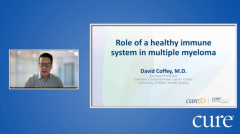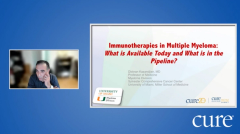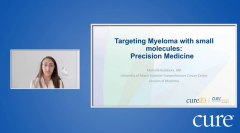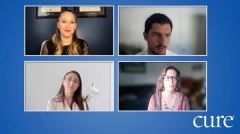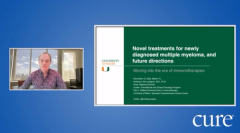
Educated Patient® Multiple Myeloma Summit Role of the Healthy Immune System Presentation: November 13, 2022
Watch Dr. David Coffey, from Sylvester Comprehensive Cancer Center at the University of Miami, discuss the role of a healthy immune system during the CURE® Educated Patient® Multiple Myeloma Summit.
Episodes in this series

As the advent of immunotherapy continues to grow in the multiple myeloma space, one area often remains forgotten about: the need for patients to maintain a healthy immune system.
At the CURE® Educated Patient® Multiple Myeloma Summit, Dr. David Coffey, assistant professor at the Sylvester Comprehensive Cancer Center at the University of Miami, discussed the role of a healthy immune system and what patients can do to improve their outcomes following a diagnosis.
To start, he explained the need for a healthy immune system when patients are receiving one of the newest types of treatments approved for multiple myeloma, chimeric antigen receptor (CAR)-T cell therapy, as it helps the body’s naturally produced T cells better target cancerous cells.
“(CAR-T cell therapy) relies on the function of the immune system to eliminate the cancer…it's not essentially going to work unless the patient has healthy T cells,” Coffey said in an interview with CURE®. “Unfortunately, both the cancer and sometimes the treatment can impair a healthy immune system in patients with myeloma. For this reason, we're trying to introduce immunotherapies earlier in the diagnosis.”
Many of the methods Coffey suggested to boost or maintain immune system function boil down to general health and wellness: eat healthy, exercise regularly, sleep well, don’t drink or smoke in excess, etc. He also recommended for patients and their caregivers to get vaccinated, adding that it is best for patients to receive shots during periods of well-controlled disease (prior to starting a line of therapy, before stem cell collection or three months after a stem cell transplant, or during a period of no therapies besides Revlimid [lenalidomide] maintenance).
Of the things he recommended against, Coffey noted that patients taking the targeted chemotherapy drug Velcade (bortezomib) should abstain from extra vitamin C, as it may inhibit the treatment and lead to increased tumor growth, which was seen in a study of mice. However, he stressed that there is no need for remaining patients with myeloma to excise vitamin C from one’s dietary choices, as it is still a necessary component of a healthy diet.
Latly, while difficult to avoid, Coffey discusses the role that stress plays on the immune system and how it can be beneficial to try to reduce it.
“There's a lot of stresses that come with a new diagnosis…I think for every person, management of and coping with stress is going to be different. For some people, it might be doing yoga or mindfulness activities,” he said. “For others, it might be doing focused meditations or perhaps it's surrounding yourself with people who make you happy. Or perhaps it's listening to music or reading books or pampering yourself by going and getting an occasional massage. So I think each person needs to identify from their own experiences what can help relieve them of stress and focus on those activities during their treatment.”
For more news on cancer updates, research and education, don’t forget to

